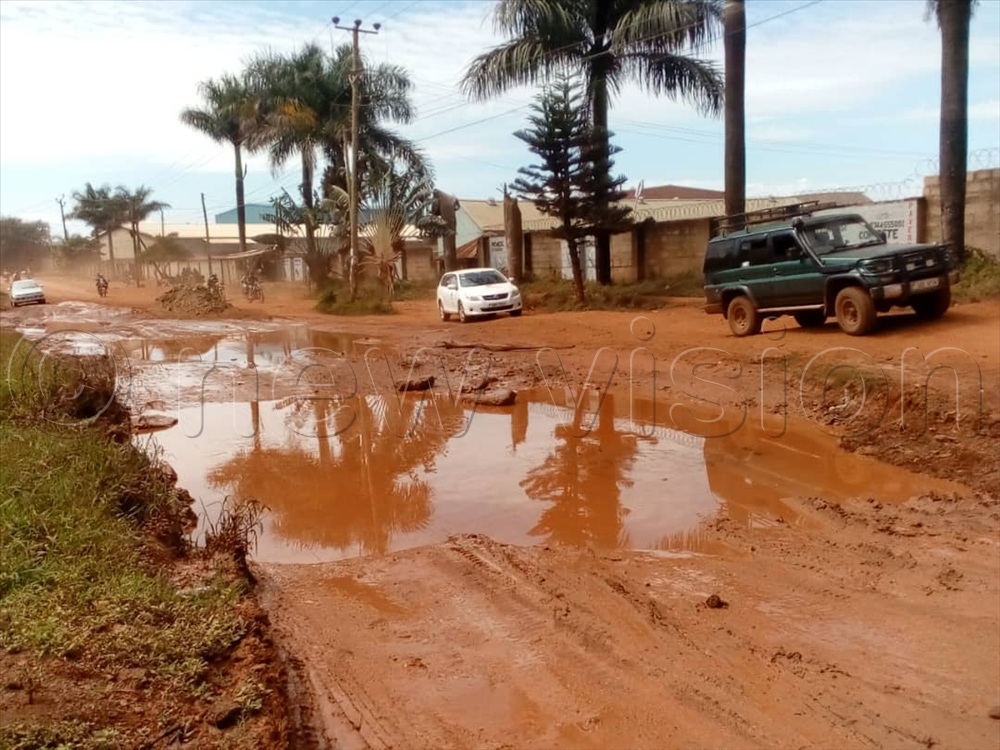Jinja appeals to government for sh36 billion for industrial roads
The road, which is in a poor state, is located in Jinja Southern Division and runs from Eng. Zikusooka Way through Walukuba and Masese before joining the Jinja–Tororo highway at Steel Rolling Mills.
A section of the Walukuba-Masese road in Jinja southern division, Jinja city, which is in a bad state. (Photos by Charles Kakamwa)
________________
Jinja city authorities have written to the government seeking sh36 billion to repair Walukuba–Masese Road, one of the key routes connecting 30 factories to the city centre and major highways.
The road, which is in a poor state, is located in Jinja Southern Division and runs from Eng. Zikusooka Way through Walukuba and Masese before joining the Jinja–Tororo highway at Steel Rolling Mills.
In a letter dated September 23, 2025, to the permanent secretary in the Ministry of Finance, Planning and Economic Development, city clerk Moses Otimong said that since 2010, this and other roads have been in disrepair, characterised by potholes and deep gullies that have severely hindered traffic and business.
“This has negatively impacted the transportation of goods and services, disrupted industrial productivity and compromised the efficiency of revenue-generating activities within the area. As such, our image regarding service delivery has been greatly impaired,” he wrote.
“To address these challenges, we propose the full rehabilitation of this road at an estimated cost of sh4 billion per kilometre, amounting to a total of sh36 billion,” he said in the letter, which was copied to, among others, the Speaker of Parliament, the ministers of works and transport, finance, and local government, as well as area Members of Parliament and the mayor.
Otimong asked the government to prioritise funding for the road’s rehabilitation, citing its strategic importance in facilitating industrial access, supporting trade logistics and sustaining national revenue mobilisation.
He said the proposed works would include the construction of drainage channels, pavement works up to bituminous seal, installation of solar street lighting and road furniture, as well as environmental and social safeguards.
Economic importance
He explained that the 9km-long and 25m-wide road serves as the principal access route to the city’s industrial area and provides direct connectivity to more than 30 factories.

Some of these, he said, include Nile Agro Industries, Engaano Millers, Keswala Group of Companies, Madhvani Group of Companies, MMI Steel Mills, Nile Ply, Sun Belt, BIDCO Uganda Limited and Alpha Woollen.
“These factories are critical drivers of Uganda’s industrial growth in revenue and employment generation. Between January 1, 2025, and the present date, the Government of Uganda has realised import duty amounting to sh337.8 billion and domestic taxes totalling sh41,423,626,470 in revenue from industries located in this industrial area of Jinja,” he said.
Former city clerk Edward Lwanga, in a similar communication to the permanent secretary in the works ministry on February 10, 2025, noted that the city has a road network of approximately 431.9km, comprising both sealed and unsealed roads.
Of this, he said, 230km are within the central business district, but the majority have exceeded their design life and are in a deteriorated condition.
On September 23, 2025, the Uganda Manufacturers Association (UMA) wrote to the works minister expressing concern over the dire state of roads in Jinja, noting that despite repeated complaints from member companies since 2018, no action has been taken.
“Masese industrial area in particular is home to over 30 industries contributing sh414.2 billion in the first half of 2025/26 and over 337.8 billion in exports and sh455.41 billion in import substitution, employing over 289,000 people directly and 610,000 people indirectly. This contribution is despite the poor road network; it could have been much higher with the right infrastructure in place,” Dr Ezra Rubanda, the UMA executive director, wrote.
“We therefore appeal to the Ministry of Works and Transport to urgently intervene by allocating sufficient resources to repair and upgrade industrial roads and other critical road infrastructure in Jinja,” Rubanda said.
He noted that repairing the roads would boost productivity and competitiveness by at least 20%, since poor infrastructure has already reduced their capacity by the same margin.
He added that the improvements would increase annual government revenue to at least sh993 billion and raise employment to 500,000 people directly and 700,000 indirectly.
Works and transport Ministry spokesperson Susan Kataike, in an interview with New Vision on Monday, October 13, 2025, advised city authorities to make better use of government funding to improve roads.
“Each financial year, local governments (districts/cities) receive sh1 billion each to purposely improve the road network. Government also gave them road equipment which should be put to use,” she said, noting that the ministry was concerned that some local leaders were not utilising the funds appropriately.
What residents say
Margaret Masaba (Walukuba Housing Estate resident)
I have lived here for 56 years but in its current state, this road has become a death trap. It becomes impassable whenever it rains due to mud and dusty on hot days, which conditions affect motorists and pedestrians.
The potholes have caused several accidents, with some resulting in loss of lives. This also stopped students who used to travel to Masese landing site for study purposes as the place became inaccessible due to the bad road.
Beatrice Achieng (City councillor, Jinja Southern Division)
I wonder why authorities continue to use marram on such an important road instead of sealing it with bitumen or asphalt. It is like we live in a remote village.
There are big taxpayers operating in this place but I wonder why government does not plough back part of the taxes collected from this industrial area to improve infrastructure for better revenue.
Pastor Paul Batambuze (NRM chairman, Danida village)
There is a lot of insecurity in the area due to lack of street lights. Criminals take advantage of the darkness to terrorise people which hinders growth. A traveller on this road requires 30 minutes to move a distance which would ideally take 10 minutes while at the same time inhaling dust.